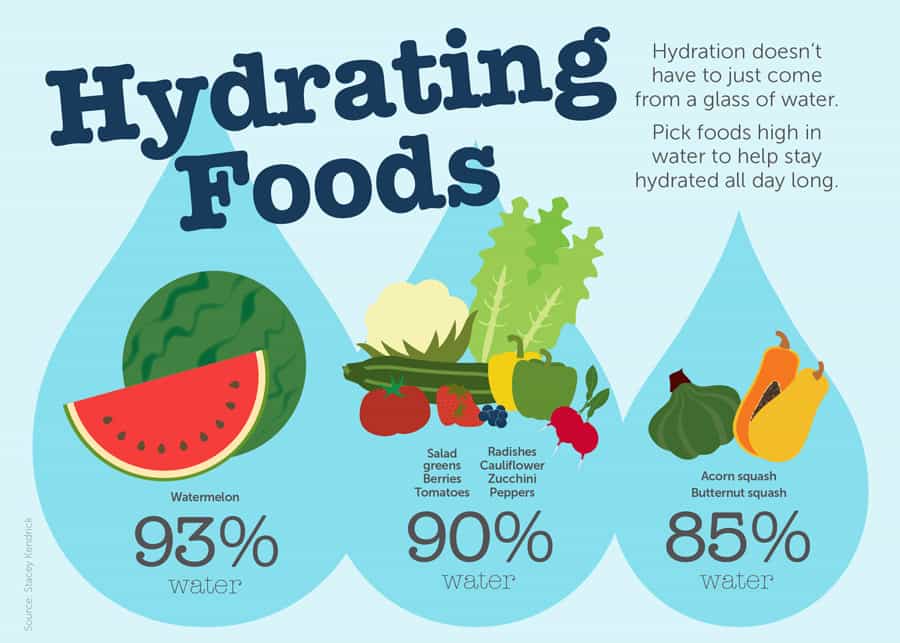Stay hydrated this summer
Ok so this is the general rule of thumb that you have probably recited or been told when it comes to staying hydrated over the summer months.
- Don’t let yourself become dehydrated when it’s hot, drink before your thirst kicks in.
- Always carry water as it is the best way to rehydrate the body and replace lost sweat.
- Dehydration can leave you feeling unwell and cause numerous health complications.
The above facts are all true and should 100% be adhered to by every reader; however these are of course just general rules. As I often find the best way to ensure everyone maintains great health and actually a great physique in hot conditions and when exercising strenuously, is through a deeper understanding of the how, why and when in regards to fluid type and the consumption amount.
With this in mind I wanted to use this article to share some eyebrow raising facts about hydration and pass over some simple advice that will hopefully become the backbone of your thought process in this area.
Did you know that females are made up of 50% water and males 60%, some say the later percentage can be as high as 70-80% dependant on what research you read. These figures of course vary dependant on your age, body type and gender. But why then do we store so much water in our bodies?
Well the answer is water makes up the composition of all our cells and blood plasma, whilst also serving to flush out toxins and support the immune system. In addition it also lubricates joints, regulates temperature and carries nutrients through our body. Therefore if your body becomes dehydrated (loses water) this will have a serious knock on effect on your internal processes which allow you to function correctly. A further consequence of this is the release of cortisol, a stress hormone which breaks down tissues and leaves your muscles looking flat and fatigued when in a dehydrated state.
Here are some interesting facts about dehydration in relation to water loss as a percentage of your body weight.
- 2% of your body weight lost in water will result in impaired physical and mental performance.
- 4% your muscular capacity (strength) declines
- 5% heat exhaustion kicks in
- 7% hallucinations occur
- 10% circulatory collapse, heat stroke and death
In example then if you weigh 60kg and lose 2% in water you will have lost 2kg in body weight. In review of these figures you should now see how your physique can change from a few hours of poor hydration. It is worth remembering that most water that is lost from the body occurs during rest or in cool conditions. In example you can lose up to 1-2 litres of water from sleeping through respiration and perspiration; so drinking lots first thing in the morning is always important.
 On top of this recommendation then, how often then should we consume water during the day? Well the general guideline is to check if your urine is clear, if it is then you just need to maintain hydration by drinking every time your thirst needs quenching. Researcher Edmund Burke PhD made the specific recommendation that we should consume about ‘150-200 millilitres every 15 minutes during training but take into consideration the daily temperature and intensity of the exercise’.
On top of this recommendation then, how often then should we consume water during the day? Well the general guideline is to check if your urine is clear, if it is then you just need to maintain hydration by drinking every time your thirst needs quenching. Researcher Edmund Burke PhD made the specific recommendation that we should consume about ‘150-200 millilitres every 15 minutes during training but take into consideration the daily temperature and intensity of the exercise’.
Did you know that consuming just water is not the only recommended fluid that the body needs during exercise. For optimal post exercise recovery to replace lost minerals, an electrolyte drink is also essential. Electrolyte replacement which comes from consuming most sports hydration drinks is important for energy production, nerve transmission and plasma restoration. These are all factors which again tie in with the dehydration and cortisol relationship mentioned above.
However don’t panic too much the composition of sweat is 99% water and 1% sodium, potassium , magnesium and chloride. So if you think you are getting a real advantage by consuming your expensive sports drink over the others drinking water think again. Most isotonic sports drinks only contain 6-8% of carbohydrates and single figure percentages for each mineral. The ideal scenario then especially when playing sport would be to drink water alongside a more cost effective sports drink which you have created yourself, using a simple recipe broken down to 25% of any fresh or organic fruit juice, 75% water and a pinch of salt.
For the reasons discussed above about the importance of water in the body, telling you that stimulants (tea’s, coffee’s) and fizzy drinks should be avoided to maintain a better standard of health and subsequent physique might not come as ground breaking news.
In short the reasons for this mainly stem around the following factors…
- A low percentage of water (<10%) which in turn lowers oxygen transportation.
- High amounts of sugar which raises blood sugar levels and causes insulin spiking, this can lead to potential weight gain as insulin helps to control the breakdown of fats.
- Many different toxins can be released from fizzy drinks especially, which attack the immune system and stimulate the release of cortisol.
- Bear in mind the above points are only 3 negative consequences from these types of drinks, it is naturally far beyond the scope of this one article to explore these areas in any sufficient depth.
However this article has met its early goals which was to consider…
- How often water needs to be consumed for athletes and non-athletes
- What might happen if hydration levels drop below what is considered healthy.
Hopefully with all of this information now in hand maintaining your water intake and a healthy physique this summer has become a far simpler task.
By

Sean Burgess (MSc, BSc (Hons), ASCC, MGBT)
SB Fitness Founder
Email: info@seanburgessfitness.com
Phone: 01202 282726
INVINCIBLE BOOTCAMP >
NO EXCUSES, JUST RESULTS




